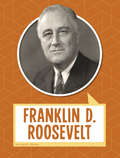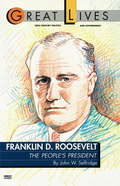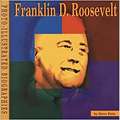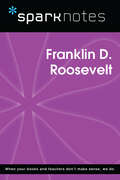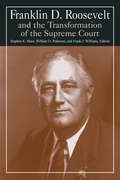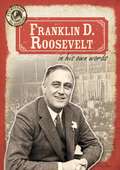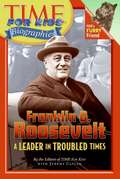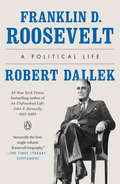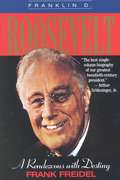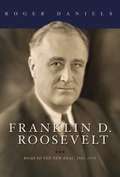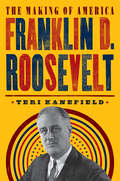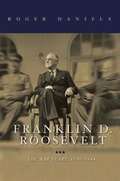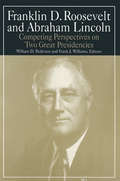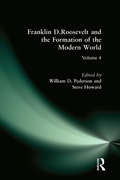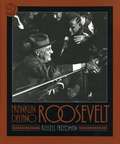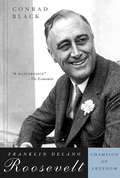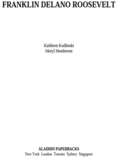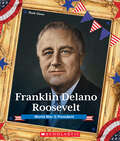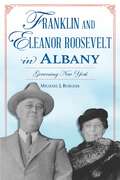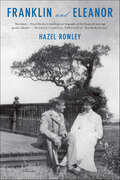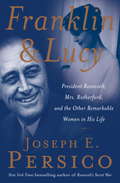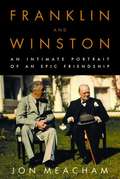- Table View
- List View
Franklin D. Roosevelt
by Laura Hamilton WaxmanFranklin Delano Roosevelt was one of the greatest presidents of the United States. When he was President, the united States had many problems, but he showed Americans that nothing is impossible.
Franklin D. Roosevelt (Biographies)
by Laura K. MurrayHow much do you know about Franklin Roosevelt? Find out the facts you need to know about the 32nd president of the United States. You'll learn about the early life, challenges, and major accomplishments of this important American.
Franklin D. Roosevelt (Great Lives Series): The People's President (Great Lives Series)
by John W. SelfridgeWitness history in the making as you turn the pages of time and discover the fascinating lives of famous explorers, leaders of twentieth-century politics and government, and great Americans. &“The only thing we have to fear is fear itself.&” With these resounding words and innovative, often controversial, programs Franklin D. Roosevelt stirred a nation to confront and triumph over the Great Depression of the 1930s, the gravest domestic crisis since the Civil War. Roosevelt then led the U.S. to victory over twin menaces from abroad—Nazi Germany and Japan—in World War II. It was a dazzling display of sustained, imaginative leadership that changed the presidency, and the country, forever. Franklin D. Roosevelt: The People&’s President depicts the life and times of one of America&’s best-loved presidents. Roosevelt paid little heed to his personal adversity—the polio that crippled his legs. Listen to his radio addresses—the famed &“fireside chats&”—and see how he showed the American people just how much a president can do.
Franklin D. Roosevelt (Photo-Illustrated Biographies)
by Steve PottsA biography discussing the personal life, education, and political career of the thirty-second President of the United States, Franklin D. Roosevelt.
Franklin D. Roosevelt (SparkNotes Biography Guide)
by SparkNotesFranklin D. Roosevelt (SparkNotes Biography Guide) Making the reading experience fun! SparkNotes Biography Guides examine the lives of historical luminaries, from Alexander the Great to Virginia Woolf. Each biography guide includes:An examination of the historical context in which the person lived A summary of the person&’s life and achievements A glossary of important terms, people, and events An in-depth look at the key epochs in the person&’s career Study questions and essay topics A review test Suggestions for further reading Whether you&’re a student of history or just a student cramming for a history exam, SparkNotes Biography guides are a reliable, thorough, and readable resource.
Franklin D. Roosevelt and the Transformation of the Supreme Court (M. E. Sharpe Library Of Franklin D. Roosevelt Studies Ser. #Vol. 3)
by William D. Pederson Stephen K. Shaw Michael R WilliamsFranklin D. Roosevelt appointed 10 justices to the U.S. Supreme Court - more than any president except Washington - and during his presidency from 1933 to 1945, the Court gained more visibility, underwent greater change, and made more landmark decisions than it had in its previous 150 years of existence. This collection examines FDR's influence on the Supreme Court and the Court's growing influence on American life.
Franklin D. Roosevelt in His Own Words
by John SheaFranklin D. Roosevelt was one of the most powerful and popular US presidents. He was the only one to serve 12 years and was elected four times. As the leader of the nation, he saw the country through an economic depression and World War II. Through primary sources, personal and political writings, and quotations, readers will become familiar with the man behind the famous name, from his early life to his momentous presidency. This book is a unique way to examine US history in the early twentieth century through the biography of one remarkable man.
Franklin D. Roosevelt: A Leader in Troubled Times
by Jeremy CaplanThis Time for Kids book vividly portrays the life of Franklin D. Roosevelt focusing on how he rescued the nation out of troubled waters.
Franklin D. Roosevelt: A Political Life
by Robert Dallek“In a period defined by division, gridlock and tweet storms, Dallek crafts a pointillist portrait of the four-term president” —Peter M. Gianotti, Newsday“Will rank among the standard biographies of its subject” —Publishers WeeklyA one-volume biography of Roosevelt by the #1 New York Times bestselling biographer of JFK, focusing on his career as an incomparable politician, uniter, and deal maker In an era of such great national divisiveness, there could be no more timely biography of one of our greatest presidents than one that focuses on his unparalleled political ability as a uniter and consensus maker. Robert Dallek’s Franklin D. Roosevelt: A Political Life takes a fresh look at the many compelling questions that have attracted all his biographers: how did a man who came from so privileged a background become the greatest presidential champion of the country’s needy? How did someone who never won recognition for his intellect foster revolutionary changes in the country’s economic and social institutions? How did Roosevelt work such a profound change in the country’s foreign relations? For FDR, politics was a far more interesting and fulfilling pursuit than the management of family fortunes or the indulgence of personal pleasure, and by the time he became president, he had commanded the love and affection of millions of people. While all Roosevelt’s biographers agree that the onset of polio at the age of thirty-nine endowed him with a much greater sense of humanity, Dallek sees the affliction as an insufficient explanation for his transformation into a masterful politician who would win an unprecedented four presidential terms, initiate landmark reforms that changed the American industrial system, and transform an isolationist country into an international superpower. Dallek attributes FDR’s success to two remarkable political insights. First, unlike any other president, he understood that effectiveness in the American political system depended on building a national consensus and commanding stable long-term popular support. Second, he made the presidency the central, most influential institution in modern America’s political system. In addressing the country’s international and domestic problems, Roosevelt recognized the vital importance of remaining closely attentive to the full range of public sentiment around policy-making decisions—perhaps FDR’s most enduring lesson in effective leadership.
Franklin D. Roosevelt: A Rendezvous with Destiny (Signature Ser.)
by Frank FreidelFreidel (history emeritus, Harvard U., U. of Washington), whose four- volume biography of the young FDR concluded with the launching of the New Deal, now offers a one-volume complete biography. Although he details Roosevelt's life before his presidency, the focus is on the Depression and wartime periods. This will probably become the standard one-volume biography. Annotation(c) 2003 Book News, Inc., Portland, OR (booknews.com)
Franklin D. Roosevelt: Road to the New Deal, 1882-1939
by Roger DanielsFranklin D. Roosevelt, consensus choice as one of three great presidents, led the American people through the two major crises of modern times. The first volume of an epic two-part biography, Franklin D. Roosevelt: Road to the New Deal, 1882-1939 presents FDR from a privileged Hyde Park childhood through his leadership in the Great Depression to the ominous buildup to global war. Roger Daniels revisits the sources and closely examines Roosevelt's own words and deeds to create a twenty-first century analysis of how Roosevelt forged the modern presidency. Daniels's close analysis yields new insights into the expansion of Roosevelt's economic views; FDR's steady mastery of the complexities of federal administrative practices and possibilities; the ways the press and presidential handlers treated questions surrounding his health; and his genius for channeling the lessons learned from an unprecedented collection of scholars and experts into bold political action. Revelatory and nuanced, Franklin D. Roosevelt: Road to the New Deal, 1882-1939 reappraises the rise of a political titan and his impact on the country he remade.
Franklin D. Roosevelt: The Making Of America #5 (The Making of America)
by Teri KanefieldThis biography for young readers explores the life of the thirty-second president, who lifted the United States from depression to global leadership.When Franklin D. Roosevelt was first elected president in 1933, America was in the throes of the Great Depression—the worst economic crisis in U.S. history—and the world was experiencing a menacing rise in Nazism and other dangerous extremists. Throughout his four presidential terms, Roosevelt was a steady and inspiring leader. He implemented progressive social reform through his New Deal agenda and helped lift America from economic crisis. He guided America to victory in World War II. Born into wealth and privilege, Roosevelt entered politics at a young age. His career and world views were shaped by his marriage to Eleanor Roosevelt and his long struggle with polio. Franklin Delano Roosevelt, our thirty-second president, forever left his mark on our nation and the world. By the time of his death, America had grown to a global economic and military superpower. His New Deal legislation changed the relationship of American citizens to their government. His policies came close to fully realizing Alexander Hamilton’s vision of a government that touches and improves the lives of all citizens.The book includes selections from Roosevelt’s writings, endnotes, a bibliography, and an index.“Kanefield provides readers with an intimate examination of Franklin Delano Roosevelt. . . . It flows in a friendly and welcoming style that reluctant readers will appreciate. . . . A solid account for both history buffs and report-writers.” —Kirkus Reviews“Neither hagiography nor a hatchet job, this evenhanded overview of FDR walks a middle path perfect for middle grade readers. A commendable addition to school and public library collections.” —School Library Journal
Franklin D. Roosevelt: The War Years, 1939-1945
by Roger DanielsHaving guided the nation through the worst economic crisis in its history, Franklin Delano Roosevelt by 1939 was turning his attention to a world on the brink of war. The second part of Roger Daniels's biography focuses on FDR's growing mastery in foreign affairs. Relying on FDR's own words to the American people and eyewitness accounts of the man and his accomplishments, Daniels reveals a chief executive orchestrating an immense wartime effort. Roosevelt had effective command of military and diplomatic information and unprecedented power over strategic military and diplomatic affairs. He simultaneously created an arsenal of democracy that armed the Allies while inventing the United Nations intended to ensure a lasting postwar peace. FDR achieved these aims while expanding general prosperity, limiting inflation, and continuing liberal reform despite an increasingly conservative and often hostile Congress. Although fate robbed him of the chance to see the victory he had never doubted, events in 1944 assured him that the victory he had done so much to bring about would not be long delayed. A compelling reconsideration of Roosevelt the president and campaigner, The War Years, 1939-1945 provides new views and vivid insights about a towering figure--and six years that changed the world.
Franklin D. Roosevelt: Thirty-second President Of The United States
by Miriam GreenblattFollows the life of the thirty-second president from birth to death, examining his childhood, education, employment, and political career.
Franklin D.Roosevelt and Abraham Lincoln: Competing Perspectives on Two Great Presidencies (Library Of Franklin D. Roosevelt Studies #Vol. 5)
by William D. Pederson Michael R WilliamsAbraham Lincoln and Franklin D. Roosevelt are widely considered the two greatest presidents of the past two centuries. How did these two very different men rise to power, run their administrations, and achieve greatness? How did they set their policies, rally public opinion, and transform the nation? Were they ultimately more different or alike? This anthology compares these two presidents and presidencies, examining their legacies, leadership styles, and places in history.
Franklin D.Roosevelt and the Formation of the Modern World (Library Of Franklin D. Roosevelt Studies #Vol. 4)
by William D. Pederson Steve HowardNo event shaped the twentieth century more than World War II, and no leader shaped the conduct of the war and the formation of the modern world more than President Franklin D. Roosevelt. In this anthology, leading scholars examine Roosevelt's role in the international arena, focusing on his diplomacy with Europe, Russia, the Baltic States, Canada, and the Caribbean; his relations with American Jews in the face of the Holocaust; his military appointments; and the operation of the Civilian War Services Division.
Franklin Delano Roosevelt
by Russell Freedman"As in Lincoln: A Photobiography (Clarion, 1987), Freedman has taken a larger-than-life historical figure about whom innumerable volumes have been written and has retold the story of one man's life in the context of his times. The carefully researched, highly readable text and extremely effective coordination of black-and-white photographs chronicle Roosevelt's priviledged youth, his early influences, and his maturation. Drawing on first-hand observations of his family, friends, and enemies, as well as Roosevelt's own diary entries, Freedman formulates a composite picture of a complex, enigmatic individual and a consummate politician. Roosevelt's public career is given further significance because of the cataclysmic events of the Depression and the tumultuous war years during his presidency. As controversial as many of his programs and policies were or have come to be, no one could ever call to question his dedication, his initiative, or the energy he brought to the job. His all too human shortcomings are just as clearly delineated. Even students with little or no background in American history will find this an intriguing and inspirational human portrait." <br>-School Library Journal
Franklin Delano Roosevelt for Kids: His Life and Times with 21 Activities
by Richard PanchykFranklin Delano Roosevelt's enduring legacy upon the history, culture, politics, and economics of the United States is introduced to children in this engaging activity book. Kids will learn how FDR, a member of one of the founding families of the New World, led the nation through the darkest days of the Great Depression and World War II as 32nd U.S. President. This book examines the Roosevelt family--including famous cousin Teddy Roosevelt and First Lady Eleanor Roosevelt--as well as FDR's early political career and subsequent 12 years in office during some of the most fascinating and turbulent times in American history. Interspersed throughout are first-hand accounts from the people who knew FDR and remember him well. Children will also learn how his personal struggles with polio and his physical disability strengthened FDR's compassion and resolve. In addition, kids will explore Roosevelt's entire era through such hands-on activities as staging a fireside chat, designing a WPA-style mural, sending a double encoded message, hosting a swing dance party, and participating in a political debate.
Franklin Delano Roosevelt: Champion of Freedom
by Conrad BlackFranklin Delano Roosevelt stands astride American history like a colossus, having pulled the nation out of the Great Depression and led it to victory in the Second World War. Elected to four terms as president, he transformed an inward-looking country into the greatest superpower the world had ever known. Only Abraham Lincoln did more to save America from destruction. But FDR is such a large figure that historians tend to take him as part of the landscape, focusing on smaller aspects of his achievements or carping about where he ought to have done things differently. Few have tried to assess the totality of FDR's life and career. Conrad Black rises to the challenge. In this magisterial biography, Black makes the case that FDR was the most important person of the twentieth century, transforming his nation and the world through his unparalleled skill as a domestic politician, war leader, strategist, and global visionary--all of which he accomplished despite a physical infirmity that could easily have ended his public life at age thirty-nine. Black also takes on the great critics of FDR, especially those who accuse him of betraying the West at Yalta. Black opens a new chapter in our understanding of this great man, whose example is even more inspiring as a new generation embarks on its own rendezvous with destiny.
Franklin Delano Roosevelt: Champion of Freedom (Childhood of Famous Americans Series)
by Kathleen V. KudlinskiThis childhood biography of the 32nd president of the United States explores the events that shaped the tenacious character of a young Franklin Delano Roosevelt.
Franklin Delano Roosevelt: World War II President (Presidential Biographies)
by Dusk GlennMeet Franklin Delano Roosevelt, our 32nd president-who battled a debilitating disease to lead America through some of its darkest days.Roosevelt took office during the Great Depression and with World War II on the horizon. He led the nation through both crises with a combination of strength and caring. He will always be remembered.This series of engaging, in-depth books introduces readers to the men who have led our country since its very first days. Lively text and colorful illustrations are supplemented by fun facts, a timeline, and even a sampling of the subject's most famous quotes.Presidential Biographies will be the first books kids reach for when writing a report-or if they're simply looking for a fascinating read!
Franklin and Eleanor Roosevelt in Albany: Governing New York (The History Press)
by Michael J. BurgessFranklin and Eleanor Roosevelt changed America with a government on the side of the people that put Americans back to work and inspired confidence that the nation could overcome the Great Depression. This is the story of their progressive legacy when FDR was Governor during the era of Prohibition and the advent of radio in the Roaring Twenties, a decade that ended with the Great Depression upending life for most Americans. This is the story of how as Governor of New York he tried the programs that became the New Deal that transformed America. It was the place where his warm, easily relatable voice heard on the radio for the first time created a bond of trust with the public that inspired confidence at a time of great fear.Author Michael J. Burgess reveals the often overlooked history of Franklin and Eleanor Roosevelt in Albany at the helm of the Empire State.
Franklin and Eleanor: An Extraordinary Marriage
by Hazel Rowley“Revelatory. . . . [This] crackling new biography of the Roosevelt marriage speaks volumes.” —Maureen Corrigan, NPR’s Fresh Air, Best Books of 2010Franklin Delano and Eleanor Roosevelt’s marriage is one of the most celebrated and scrutinized partnerships in presidential history. It raised eyebrows in their lifetimes and has only become more controversial since their deaths. From FDR’s lifelong romance with Lucy Mercer to Eleanor’s purported lesbianism—and many scandals in between—the American public has never tired of speculating about the ties that bound these two headstrong individuals. Some claim that Eleanor sacrificed her personal happiness to accommodate FDR’s needs; others claim that the marriage was nothing more than a gracious façade for political convenience. No one has told the full story until now.In this groundbreaking new account of the marriage, Hazel Rowley describes the remarkable courage and lack of convention—private and public—that kept FDR and Eleanor together. She reveals a partnership that was both supportive and daring. Franklin, especially, knew what he owed to Eleanor, who was not so much behind the scenes as heavily engaged in them. Their relationship was the product of FDR and Eleanor’s conscious efforts—a partnership that they created according to their own ambitions and needs.In this dramatic and vivid narrative, set against the great upheavals of the Depression and World War II, Rowley paints a portrait of a tender lifelong companionship, born of mutual admiration and compassion. Most of all, she depicts an extraordinary evolution—from conventional Victorian marriage to the bold and radical partnership that has made Franklin and Eleanor Roosevelt go down in history as one of the most inspiring and fascinating couples of all time.
Franklin and Lucy: President Roosevelt, Mrs. Rutherfurd, and the Other Remarkable Women in His Life
by Joseph E. PersicoFranklin Delano Roosevelt was arguably the greatest figure of the twentieth century. While FDR's official circle was predominantly male, it was his relationships with women--particularly with Lucy Mercer Rutherfurd--that most vividly bring to light the human being beneath this towering statesman. It is no coincidence that Rutherfurd was with Roosevelt the day he died in Warm Springs, Georgia, along with two other close women companions. In Franklin and Lucy, acclaimed author and historian Joseph E. Persico explores FDR's romance with Lucy Rutherfurd, which was far deeper and lasted much longer than was previously acknowledged. Persico's provocative conclusions about their relationship are informed by a revealing range of sources, including never-before-published letters and documents from Lucy Rutherfurd's estate that attest to the intensity and scope of the affair.FDR's connection with Lucy also creates an opportunity for Persico to take a more penetrating look at the other women in FDR's life. We come to see more clearly how FDR's infidelity as a husband contributed to Eleanor's eventual transformation from a repressed Victorian to perhaps the greatest American woman of her century; how the shaping hand of FDR's strong-willed mother helped to imbue him with the resolve to overcome personal and public adversity throughout his life; and how other women around FDR, including his "surrogate spouse," Missy LeHand, and his close confidante, the obscure Margaret "Daisy" Suckley, completed the world that he inhabited. Franklin and Lucy is an extraordinary look at the private life of a leader who continues to fascinate scholars and the general public alike. In focusing on Lucy Rutherfurd and the myriad women who mattered to Roosevelt, Persico paints a more intimate portrait than we have heretofore had of this enigmatic giant of American history.
Franklin and Winston: An Intimate Portrait of an Epic Friendship
by Jon MeachamNEW YORK TIMES BESTSELLER • In this &“beautifully written and superbly researched dual biography&” (Los Angeles Times Book Review), Pulitzer Prize–winning biographer Jon Meacham &“paints a powerful portrait of the enormous friendship between World War II allies [Franklin] Roosevelt and [Winston] Churchill&” (Vanity Fair). &“Intense and compelling reading.&”—The Washington PostFranklin Roosevelt and Winston Churchill were the greatest leaders of &“the Greatest Generation.&” In Franklin and Winston, Jon Meacham explores the fascinating relationship between the two men who piloted the free world to victory in World War II. Born in the nineteenth century and molders of the twentieth and twenty-first, Roosevelt and Churchill had much in common. In their own time both men were underestimated, dismissed as arrogant, and faced skeptics in their own nations—yet both magnificently rose to the central challenges of the twentieth century. Theirs was a kind of love story, with an emotional Churchill courting an elusive Roosevelt. The British prime minister, who rallied his nation in its darkest hour, standing alone against Adolf Hitler, was always somewhat insecure about his place in FDR&’s affections—which was the way Roosevelt wanted it. A man of secrets, FDR liked to keep people off balance, including his wife, Eleanor, his White House aides—and Winston Churchill.Meacham&’s sources—including unpublished letters of FDR&’ s great secret love, Lucy Mercer Rutherfurd, the papers of Pamela Churchill Harriman, and interviews with people who were in FDR and Churchill&’s joint company—shed light on the characters of both men as he engagingly chronicles the hours in which they decided the course of the struggle.Charting the personal drama behind the discussions of strategy and statecraft, Meacham has written the definitive account of the most remarkable friendship of the modern age.

